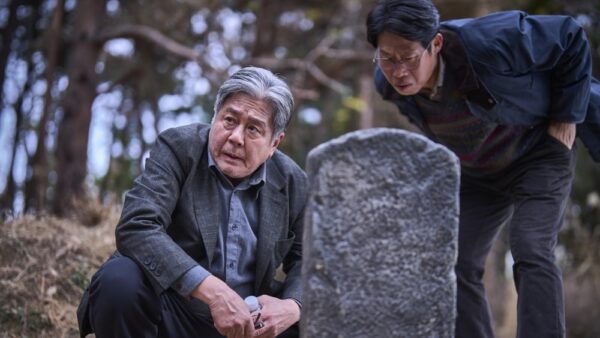
Writer/director Jae-hyun Jang‘s immensely popular Korean horror film, Exhuma, takes a relatively simple premise about a team of paranormal investigators and spins it into a tale about history and class.
Divided into six parts, the narrative initially follows cool, unflappable Hwa-rim (Kim Go-eun) and her partner Bong-Gil (Lee Do-hyun). They’re hired by the wealthy Park family to travel from Korea to Los Angeles to cure the Parks’ newborn who cries constantly. Eventually it’s uncovered that the condition is hereditary: it has affected the last two successive generations of first-born Park boys.
Mr Park (Kim Jae-cheol) requests an exhumation of his grandfather’s grave in Northern Gangwon – he’s willing to pay $500K but has certain conditions, chief among them that the coffin must *not* be opened.
At this point two other key characters enter the narrative: geomancer Kim Sang-duk (Choi Min-sik) and his associate Mr Ko (Yoo Hae-jin). The rest of the film follows the quartet as they first exhume the coffin, try to destroy and, following circumstances beyond their control, attempt to contain the evil that is unleashed when it is opened.
The transition from the initial exhumation to the containment of what comes out of it ultimately divides the film in two. The first half is dominated by a sense of creeping dread, reinforced by striking visuals such as Kim Sang-duk tasting the tainted earth at the burial site; a coffin buried vertically in the ground; and close-ups of the coffin wrapped tight with barbed wire. Each visual signifier contributes to a pervasive sense of ominous dread in the first half of the film.
That tone shifts slightly when the evil escapes: what began as a mystery becomes a kind of supernatural slasher as the team races to prevent a string of murders, while keeping astray of violence themselves.

What makes Exhuma unique is how steeped in culture and history it is. The backstory of the curse(d object) is tied to the fraught history between Korea and Japan, and the explanation for why the Park family is targeted is tied to generational wealth and greed. Add in the specific references to burial plots (Kim Sang-duk’s area of specialty) and Exhuma is engaged in a deeply Korean conversation.
Non-native audiences will still be able to appreciate the narrative without understanding the cultural nuances, though David Opie’s analysis for Indiewire of the film’s domestic success, as well as the linked piece to the Korea Times on the burial plots, will help to highlight the film’s greater meanings.
Even for audiences unwilling to research the film, however, Exhuma is worth the investment. While the shift in tone between Parts 3 and 4 initially requires a soft expectation reset, the back half of the film pays off on both the supernatural elements, as well as the gore. There’s a stand-out sequence set at a sheep farm at night that makes superb use of both lighting and depth of field to stage a gory murder, a musical ritual involving dance and pig carcasses, and a fog-shrouded finale that is expertly timed like a countdown clock.
Throw is stand-out performances by Choi (as the cautious, seasoned expert) and Kim (as the young, slightly chilly, go-getter) and Exhuma is an enthralling, unique exploration of intergenerational curses, national history, and spectral hauntings. It’s another strong international title that horror audiences should seek out. 3.5/5
Exhuma is now playing in limited theatrical release.